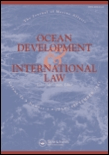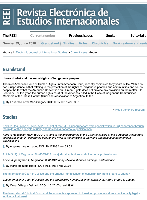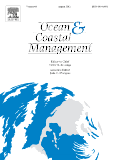
International Journal of Marine and Coastal Law
Scope & Guideline
Navigating the Legal Waters of Marine and Coastal Environments
Introduction
Aims and Scopes
- Marine Environmental Law:
The journal explores legal frameworks and policies aimed at the protection and conservation of marine ecosystems, addressing issues such as marine pollution, biodiversity conservation, and the impacts of climate change on the ocean. - International Treaties and Agreements:
A significant focus on the analysis and implications of key international treaties, such as the United Nations Convention on the Law of the Sea (UNCLOS), the London Convention, and emerging agreements related to biodiversity and plastic pollution. - Dispute Resolution Mechanisms:
The journal examines the legal processes and frameworks for resolving maritime disputes, including jurisdictional issues and the role of international tribunals, offering insights into case law and evolving legal practices. - Sustainable Ocean Governance:
Research on the governance structures necessary for the sustainable management of ocean resources, including fisheries, marine protected areas, and the role of coastal states in resource management. - Human Rights and Ocean Issues:
A unique contribution of the journal is its focus on the intersection of human rights and marine law, exploring how legal frameworks can protect the rights of communities affected by ocean governance decisions. - Emerging Technologies and Marine Law:
The exploration of how new technologies, such as marine autonomous vehicles and remote sensing, impact maritime law and governance, addressing the legal challenges and opportunities these technologies present.
Trending and Emerging
- Ocean-Climate Nexus:
An increasing number of papers focus on the relationship between ocean health and climate change, highlighting the legal implications and necessary adaptations in marine governance to address this critical intersection. - Plastic Pollution and Marine Law:
There is a growing emphasis on the legal frameworks needed to combat marine plastic pollution, reflecting global awareness and urgency in addressing this environmental crisis through international cooperation. - Gender Equality in Ocean Governance:
Emerging discussions on advancing gender equality in ocean affairs indicate a trend towards inclusivity in marine governance, recognizing the importance of diverse perspectives in decision-making processes. - Innovative Governance Mechanisms:
Research on innovative governance approaches, including science-policy interfaces and nature-positive engineering, suggests a shift towards adaptive and integrative strategies for managing marine resources sustainably. - Human Rights Considerations:
A noticeable trend is the incorporation of human rights perspectives into marine law discussions, emphasizing the need for legal frameworks that protect vulnerable communities affected by ocean governance decisions.
Declining or Waning
- Traditional Maritime Security Issues:
There has been a noticeable decrease in papers focusing on traditional maritime security concerns, such as piracy and naval operations, as newer challenges like climate change and biodiversity loss gain prominence. - Historical Perspectives on Maritime Law:
Research emphasizing historical analyses of maritime law and its evolution appears to be declining, as contemporary issues take precedence in the discourse surrounding marine governance. - Regional Fisheries Management:
While still relevant, the specific focus on regional fisheries management organizations has lessened, possibly due to a broader shift towards global frameworks and comprehensive treaties addressing fisheries sustainability. - National Interests in Maritime Law:
The exploration of national interests in maritime law, particularly in the context of resource extraction and territorial claims, has diminished as the journal increasingly emphasizes collaborative and multilateral approaches to ocean governance.
Similar Journals

Ocean Science Journal
Bridging Research and Practice in OceanographyOcean Science Journal, published by the Korea Institute of Ocean Science and Technology (KIOST), is a pivotal resource for scholars and practitioners in the field of oceanography. With the ISSN 1738-5261 and E-ISSN 2005-7172, this journal presents cutting-edge research from 2006 to 2024, bridging fundamental and applied ocean sciences. Based in South Korea, with its headquarters located in Busan, the journal has achieved a commendable Scopus rank of #72 out of 145 in the domain of Earth and Planetary Sciences, placing it in the 50th percentile among peer publications. Classified in the Q3 category of the 2023 Oceanography rankings, Ocean Science Journal offers a platform for innovative studies that advance understanding of marine environments and promote sustainable ocean practices. While it does not operate under an open access model, readers and contributors can expect high-quality, peer-reviewed material that addresses pressing oceanic challenges and developments. This journal serves as an essential tool for researchers, professionals, and students committed to fostering marine science and ocean technology.

Air & Space Law
Navigating the Legal Skies and BeyondAir & Space Law is a prestigious academic journal published by Kluwer Law International, committed to advancing legal scholarship within the realm of air and space law. Serving as a critical platform for researchers, professionals, and students, this journal explores the intricate legal challenges arising from aviation and space exploration activities. With an ISSN of 0927-3379 and an E-ISSN of 1875-8339, it has established itself in the competitive legal landscape, currently holding a Q2 ranking in the Law category, positioning it within the top half of its field according to the latest Scopus metrics. Although it does not offer open access, the journal remains accessible to a wide audience via institutional subscriptions, disseminating pivotal insights that shape international policy and regulatory frameworks. The converged years from 2018 to 2024 reflect a commitment to evolving discourse, making it an invaluable resource for those engaged in the nuanced intersections of law, technology, and global governance.

OCEAN DEVELOPMENT AND INTERNATIONAL LAW
Bridging Law and Ocean StewardshipOCEAN DEVELOPMENT AND INTERNATIONAL LAW, published by Taylor & Francis Inc, is an esteemed journal dedicated to the interdisciplinary study of ocean governance, environmental law, and international relations concerning marine resources. With an ISSN of 0090-8320 and an E-ISSN of 1521-0642, this journal serves as a vital platform for researchers, legal scholars, and policymakers interested in the evolving challenges of ocean development in a globalized context. The journal has established itself as a resourceful publication, evidenced by its ranking in the 2023 Scopus categories, where it is positioned in the 75th percentile for Law and the 66th percentile for Political Science and International Relations. Operating for over four decades, from 1973 until 2024, it is pivotal for advancing knowledge and fostering dialogue on critical issues such as environmental sustainability, international maritime policies, and legal frameworks governing the seas. Despite being a subscription-based journal, OCEAN DEVELOPMENT AND INTERNATIONAL LAW remains influential, offering significant insights that contribute to the development of effective legal instruments and governance strategies for oceanic resources.

Revista Electronica de Estudios Internacionales
Navigating the Complexities of Global AffairsRevista Electronica de Estudios Internacionales is a prominent academic journal dedicated to the exploration of international studies, published by the esteemed ASOC ESPANOLA PROFESORES DERECHO INT & RELACIONES INT-AEPDIRI. Based in Spain, this journal has embraced an Open Access model since its inception in 2000, allowing researchers, students, and professionals to freely access and disseminate significant findings in the field. With an ISSN of 1697-5197, the journal highlights critical issues surrounding international law and relations, maintaining a vital role in the ongoing discourse within the academic community. Currently categorized as Q4 in the Law field and ranked #755 out of 1025 within the Scopus database, the journal offers a platform for innovative thinking and scholarly contributions, which are particularly important in today's rapidly evolving global scenario. Explore the latest research and insights from 2019 to 2023 in this essential resource for those engaged in the study and practice of international relations.

OCEAN DYNAMICS
Decoding the Dynamics of Our OceansOCEAN DYNAMICS is a premier peer-reviewed journal published by Springer Heidelberg, dedicated to advancing the field of oceanography. With an ISSN of 1616-7341 and an E-ISSN of 1616-7228, the journal has established itself as a key resource for researchers and professionals interested in the dynamic processes of the world's oceans. As of 2023, it holds an impressive Q2 category ranking in Oceanography, placing it among the top journals in its field (Rank #34/145, 76th percentile in Earth and Planetary Sciences). Although operating under a traditional publishing model without open access options, OCEAN DYNAMICS continues to provide valuable insights and a platform for innovative research, boasting coverage from 2001 to 2024. Researchers and students alike will benefit from this journal's commitment to showcasing cutting-edge studies that enhance our understanding of oceanographic phenomena.

Jurnal Ilmu dan Teknologi Kelautan Tropis
Empowering science to safeguard marine biodiversity.Jurnal Ilmu dan Teknologi Kelautan Tropis (ISSN: 2087-9423, E-ISSN: 2085-6695) is a premier scientific journal published by the Indonesian Oceanologists Association in collaboration with the Bogor Agricultural University, specifically from the Department of Marine Science and Technology. This journal is committed to advancing the field of tropical marine science, publishing high-quality research that addresses pressing issues in oceanography, marine ecosystems, and sustainable practices in tropical regions. By facilitating open access to valuable scientific knowledge, Jurnal Ilmu dan Teknologi Kelautan Tropis aims to engage researchers, professionals, and students alike, fostering collaboration and innovation in marine research. Located in the picturesque region of Bogor, West Java, Indonesia, this journal serves as a vital platform for disseminating findings that contribute to the conservation and effective management of tropical marine resources.

Ocean Science
Connecting Scholars through Oceanic InsightsOcean Science, published by COPERNICUS GESELLSCHAFT MBH, stands as a premier Open Access journal in the fields of Oceanography and Paleontology, with a commendable impact factor that highlights its influence in the scientific community. Since its inception in 2005, Ocean Science has provided a vital platform for the dissemination of innovative research and discoveries, boasting prestigious rankings of Q1 in both Oceanography and Paleontology categories as of 2023, along with impressive Scopus rankings (7th in Paleontology and 28th in Oceanography). Based in Göttingen, Germany, the journal's commitment to open access ensures that groundbreaking research is readily available to a global audience, fostering knowledge sharing and collaboration among academics, professionals, and students alike. As it converges towards its 20th anniversary in 2024, Ocean Science continues to be an essential resource for those dedicated to advancing our understanding of the marine environment and its geological history.

GEO-MARINE LETTERS
Navigating the Frontiers of Environmental ScienceGEO-MARINE LETTERS, published by Springer, is a prestigious academic journal that has been a pivotal platform for the dissemination of innovative research in the fields of Earth and Planetary Sciences, Oceanography, Environmental Science, and Geotechnical Engineering since its inception in 1981. With an E-ISSN of 1432-1157, this journal has established itself in the Q2 quartile across multiple categories in 2023, indicating its influential position within the scientific community, as reflected by its Scopus rankings. While it currently does not offer an open access option, its rigorous peer-review process ensures the publication of high-quality research that contributes significantly to advancing our understanding of marine and geological sciences. Researchers, professionals, and students alike will benefit from the diverse scope of studies featured in GEO-MARINE LETTERS, making it an essential resource for those engaged in environmental and marine research. Situated in Germany, the journal's commitment to excellence continues to shape critical discussions and innovations in the field.

Journal of Operational Oceanography
Advancing Operational Excellence in Oceanographic StudiesThe Journal of Operational Oceanography, published by Taylor & Francis Ltd, stands as a pivotal platform within the field of oceanography, focusing on the integration of operational practices, technology, and scientific research. With a strong impact factor and a notable Q2 quartile ranking in the category of Earth and Planetary Sciences, this journal offers researchers, professionals, and students a vital resource for disseminating new knowledge and innovative methodologies related to ocean studies. Covering a range of topics from marine data analysis to the application of oceanographic principles in sustainable practices, the journal’s content is crucial for advancing understanding in this dynamic field. Operating since 2008 and continuing through 2024, it is dedicated to fostering collaboration and dialogue among the scientific community, ensuring accessibility to essential findings that drive informed decision-making in marine science. With its commitment to high-quality, peer-reviewed articles and a ranking in the top 10th percentile of its category, the Journal of Operational Oceanography is an indispensable resource for those looking to make significant contributions to marine research.

OCEAN & COASTAL MANAGEMENT
Navigating the Future of Coastal SustainabilityOCEAN & COASTAL MANAGEMENT is a premier journal dedicated to the multifaceted fields of oceanography, aquatic science, and coastal management. Published by ELSEVIER SCI LTD and located in the United Kingdom, this esteemed journal boasts a remarkable Q1 ranking in prestigious categories, including Aquatic Science and Oceanography, reflecting its influential contributions to the field since its inception in 1992. The journal is recognized for its high impact, boasting a commendable presence in Scopus rankings across related disciplines, with notable placements in the 94th percentile for Aquatic Science and 92nd percentile for Oceanography. Although it operates under a subscription model, OCEAN & COASTAL MANAGEMENT continues to serve as a vital resource for researchers, professionals, and students seeking to advance their understanding of coastal ecosystems and effective management strategies. Through rigorous peer-reviewed research, the journal aims to foster knowledge exchange and practical applications in policy-making and environmental stewardship, making it an essential read for anyone engaged in the preservation and sustainable use of oceanic resources.